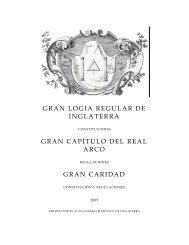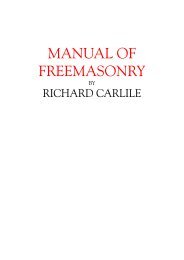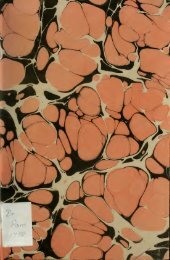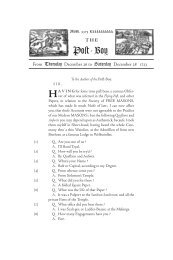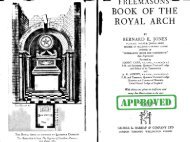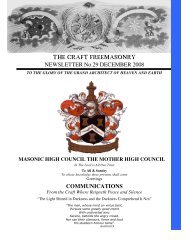THE CRAFT FREEMASONRY - Masonic High Council the Mother ...
THE CRAFT FREEMASONRY - Masonic High Council the Mother ...
THE CRAFT FREEMASONRY - Masonic High Council the Mother ...
Create successful ePaper yourself
Turn your PDF publications into a flip-book with our unique Google optimized e-Paper software.
- The Christian elements of <strong>the</strong> ceremony were removed or replaced. In particular, <strong>the</strong> words on <strong>the</strong><br />
Sojourner’s scroll were changed from “In <strong>the</strong> beginning was <strong>the</strong> Word . . . ” to “In <strong>the</strong> beginning God<br />
created <strong>the</strong> Heavens and <strong>the</strong> Earth . . . ”. All references to <strong>the</strong> “Rose of Sharon” and “Lily of <strong>the</strong> Valley”<br />
were dropped.<br />
- The Principals’ Lectures were introduced.<br />
The Chapter of Promulgation was successful in London and <strong>the</strong> immediate surrounding areas but was<br />
far less successful with regard to more distant Chapters. Some Chapters, as in <strong>the</strong> case of <strong>the</strong> Chapter<br />
of Concord in Bolton, now No. 37, deputed a Past First Principal to travel to London to obtain <strong>the</strong><br />
necessary instruction. His trip was funded by his own and o<strong>the</strong>r local Chapters. It is also known that<br />
Rev. G.A. Browne by now Grand Superintendent of Suffolk, held a Chapter of Principals for instruction<br />
in Bury St. Edmunds and, on <strong>the</strong> following day, one for <strong>the</strong> instruction of Companions in General. One<br />
can assume that what he did in one centre, he and o<strong>the</strong>rs did elsewhere. In general however many<br />
country Chapters were soon in trouble. Because <strong>the</strong> rule that only Installed Masters could occupy <strong>the</strong><br />
Principals’ Chairs had been enforced by <strong>the</strong> new Regulations, something which since 1826 had often<br />
been disregarded, some country chapters found it totally impossible to find enough qualified members<br />
to be Installed. In fact as late as 1839 <strong>the</strong>re were some Taunton Chapters where <strong>the</strong> chairs had never<br />
been conferred in an esoteric manner. Some zealous Somerset Principals obtained <strong>the</strong> necessary<br />
instruction in <strong>the</strong> Chapter of Promulgation and from it chapters in Bath, Tiverton, Yeovil and Taunton<br />
benefited but in 1835 <strong>the</strong>y still had not a single duly Installed Principal. These instances were typical of<br />
many.<br />
Although <strong>the</strong> catechisms in <strong>the</strong> opening and closings were dropped, <strong>the</strong>re is still a remnant but it does<br />
not occur during <strong>the</strong> convocation of <strong>the</strong> Chapter but after <strong>the</strong> festive board during <strong>the</strong> dialogue<br />
between <strong>the</strong> First Principal and <strong>the</strong> Principal Sojourner. This table ritual concludes with a toast which<br />
continues an old Craft custom. In Browne’s “Master Key” of 1798 <strong>the</strong>re is a First Degree toast “To <strong>the</strong><br />
pious memory of <strong>the</strong> two Saint Johns, those two great parallels in Masonry” from which practice we<br />
may well have taken our toast to <strong>the</strong> “Grand Originals”.<br />
ANCIENT SYMBOLISM<br />
We concentrate on <strong>the</strong> word 'initiation" as being <strong>the</strong> great step taken by a man to become<br />
Freemason. What about <strong>the</strong> great step to become a Royal Arch Mason? Isn't that ano<strong>the</strong>r kind<br />
of initiation, or perhaps we can give it a better word -a rebirth -so that we can look at each level<br />
of advancement in <strong>Masonic</strong> adeptness as a re-birth into a greater vault of existence?<br />
The word initiation can conjure differing visualisations to many people. The fundamental<br />
definition likewise may mean different things to different people. But <strong>the</strong>re is only one basis for<br />
defining initiation. Initiation is probably best defined as some unique or unusual experience<br />
befalling someone, which makes an impact on a person's spiritual sensibility -in o<strong>the</strong>r words,<br />
that person experiencing something best expressed as soul-shaking. Unfortunately, common<br />
usage of a word tends to obscure its meaningful import.<br />
The ceremony of initiation is meaningless unless it is conducted in an appropriate architectural setting.<br />
By reason or its own insistence on secrecy, <strong>Masonic</strong> understanding becomes difficult to acquire because<br />
one has to search quite diligently to find it, and most of us cannot be bo<strong>the</strong>red to do that in view or <strong>the</strong><br />
laborious forays required to enter into <strong>the</strong> vaults of <strong>Masonic</strong> learning, only to find that we are not<br />
competent to understand <strong>the</strong> symbolical specifications or our beautiful orders.<br />
There is little doubt that our Western civilisation emanated a few thousand years ago in <strong>the</strong><br />
riverine complex of Mesopotamia, what is today known as Iraq. It is known that up to about<br />
4,500 B.C., humanity in that region and o<strong>the</strong>r centres with developing cultures such as Jericho<br />
(7,000 B.C.), Crete (4,500 B.C.) and in <strong>the</strong> regions later to be known as <strong>the</strong> Ugarite and Hittite<br />
enclaves of S.E. Turkey, and, of course, <strong>the</strong> dwellers of <strong>the</strong> Nile. It now seems that also living<br />
across and over <strong>the</strong> Caucasus, into <strong>the</strong> steppes of Central Asia, lived <strong>the</strong> Aryans, who, around<br />
4,500 B.C., started raiding <strong>the</strong> Sumerians of upper Iraq and by around 4,300 conquered <strong>the</strong>m.<br />
The important change in culture involved a change of religion of <strong>the</strong> Sumerians from a mo<strong>the</strong>r goddess<br />
religion to a patriarchal religion .Some archaeologists, anthropologists and <strong>the</strong>ologians<br />
37



